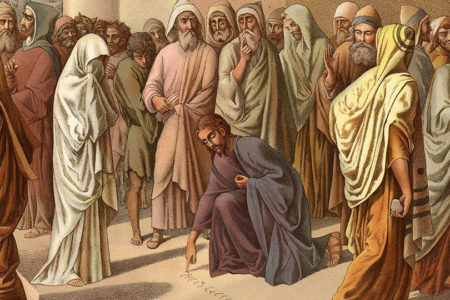Zvi Apr/May 1997
The Bible teaches that God wants us to have joy and happiness, but if you take a good look around the little country of Israel you will discover that most of the people are not happy. In fact, they seem to be in a constant state of mourning because of the serious situation here. It is like living on top of an active volcano. Many of the people are turning their eyes toward heaven and asking, “Where does my help come from?” Yes, they are unhappy, but it is because they do not trust in the Lord, and therefore they do not receive the answers they seek.
I certainly have had as much if not more experience with mourning as any Israeli, and so I tell the people I meet that help can come from the Lᴏʀᴅ, the Maker of heaven and earth (Ps. 121:2). This is not easy to say to people who have experienced great sorrow. There is hardly a person in this country who has not lost a dear one in the military or through terrorist attacks on civilians. I therefore go among them and try to encourage them.
Recently some people responded by saying, “It is a simple thing for you to say that our help will come from heaven, but have you ever eaten the meal whose name is Mourning?” I replied, “Oh yes, and not just once, but many times and for a long time. I know how that meal tastes. There were times when I actually felt jealous of the dead. No, you are not alone. Therefore, I have come to encourage you. I know exactly how you feel. I am not saying that you should rejoice because of the tragedies we are experiencing these days. But it is my duty to show you that there is yet a future ahead of you—a good future, if you will accept it.”
I then read Job 19:15–27, emphasizing verses 25 and 26: “For I know that my redeemer liveth, and that he shall stand at the latter day upon the earth; And though after my skin worms destroy this body, yet in my flesh shall I see God.” As we began to discuss Job, these people asked about the troubles I had mentioned. I told them, “It was during the Nazi Holocaust in Europe. That was a time when human life had no value, especially if you were a Jew. I was very far away from God, but I could tell that the few who were close to Him were not as depressed as I was because they had hope. But what did I have? Everything was black before my eyes. I was without hope because I did not know the Lord. Now, when I look at you and many others in this country, I know that it is my duty to comfort you through the love of the Lord. As we always say, Jews are responsible for one another.”
Although these people were listening respectfully, I certainly understood that it was very difficult for them to accept my words. Finally one of them said, “It is very nice of you to try to encourage us, but that job belongs to the religious Jews. We can tell from your appearance that you are not one of them. How, then, did all of these thoughts come to you?” I replied, “Clothes and a beard do not make a person ‘religious.’ It is what is in your heart—what is between you and the Lord. Have any of these so-called ‘religious’ people visited you or tried to comfort and encourage you? Apparently they don’t think that is their duty. But I tell you that it is our duty, as the Chosen People of God, to go to everyone in the world and tell them about the hope that can be found only in the Lord. In spite of all our troubles, we are not lost because our Redeemer lives, and, as Job said, I too can say that I will see Him with my own eyes. The only reason I can say that is because I have put my faith and trust in Him.”
This explanation was not enough for them. They wanted to know how I had come to believe in God as I do. I replied, “Because you are so interested, it will be my great joy to tell you. Sitting here, in the midst of all this mourning, is the best place to speak about the Lord and what He has done for us.”
By now these people had stopped looking at me as if I were a stranger. They now seemed to consider me a friend. I then began to tell them how I had found my Redeemer, my Savior, Yeshua Hamashiah. (In Israel, you cannot immediately refer to the Lord by His English name, Jesus Christ, because the people would refuse to listen. But the same words spoken in Hebrew—although they have the same meaning—are Kosher to them.) I explained to these downhearted people who He was and is, and everything that He has done for us. All the things I told them were taken from the Hebrew Scriptures, so that they would not be able to come back later and accuse me of reading to them from a Christian book and trying to make them become Christians while they were in mourning. Of course, the Old Testament speaks so much about our Savior that it is easy to bring Jewish people the good news of the gospel straight from their own roots in Judaism.
What a wonderful time I had that day. I was sure that someone would say it was not the time or place to speak about Jesus, but instead they were very interested and wanted to know more. As the Book of the Revelation says so many times, “He that hath an ear, let him hear.” I pray that these people were listening with open hearts and that they will soon have their spiritual ears and eyes opened and accept our Savior, Yeshua Hamashiah, before it is too late.







